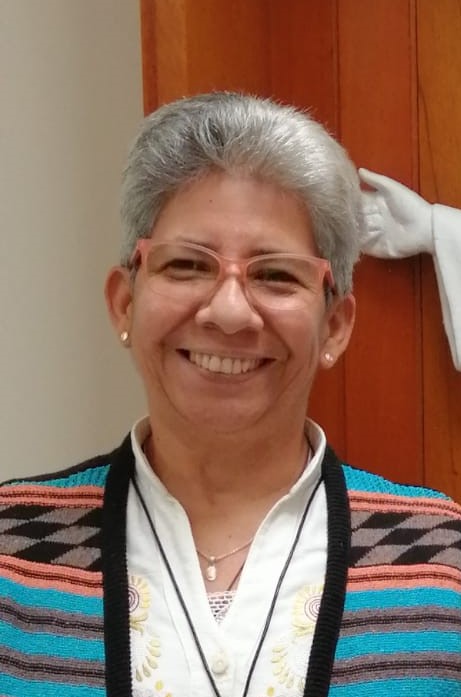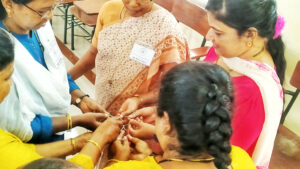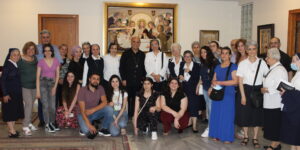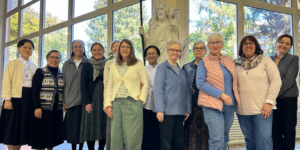Sister Yolanda was born in Cúcuta in Colombia, near the border with Venezuela. She entered the Congregation in 1986, making her temporary profession in 1990 and her perpetual profession in 1996. Here she shares how she has always been drawn by love and passionate about justice throughout her life.
Can you share something of the origin of your vocation to serve the mission?
I am an ex-student of the De La Salle Brothers high school. They used to bring us to the ministries they ran for teenage girls and boys living on the street or having family problems. And I was always struck by this vulnerable group; I was always drawn towards them. I also had an actual sister who entered the Congregation long before I joined. So, I had seen firsthand the work of the sisters and their commitment to vulnerable girls and women.
I’ve always had an awareness of people in vulnerable situations, particularly street children. Something that always left a mark on me was when I worked as a carpenter with my dad in his workshop. I often repaired the little boxes the children who polished shoes used to store their work things. My dad would always catch my eye and say: What are you doing? Look, these children have started to come here now; they might steal something,” and I said: “No, Dad, they need to have their boxes repaired; it’s what they use for work.” I always had a sense to serve and help the most vulnerable and towards justice, equity, and the dignity of every human being.
How have you been able to live out your vocation to serve the mission, and how have you seen the Congregation’s approach to mission evolve?
I’m grateful to God for having been involved in various ministries with girls and women in very vulnerable situations, for example, in prostitution, prison, and migration, in single mothers’ homes, or others such as the pastoral care of the sick, family support, and development of micro-enterprise and income-generating projects. I’ve also had the privilege of being involved in congregational-level justice and peace work in my mission and role as communications coordinator at the International Office for Justice and Peace in New York and an NGO representative in Geneva.
During my almost 36 years as a religious sister, I would say that the most notable change I have witnessed in our service for mission is how the person no longer comes to us, but that we go out to meet them. For example, our ministries were more institutional years ago, and women were often in boarding schools or prisons. But over the years, emerging realities have increasingly called us to encounter these girls, women, and children in society, in their migrant situations, in the violence they experience at home and at work, and in the lived realities of their environments. We’ve had to move to respond to new forms of violence that are emerging, new forms of exploitation, and new ways of intervention. The reality may be the same, but the forms and ways we need to respond to them are different.
So, when I think of service for mission, I’m talking about responding to emerging needs that are arising and which are increasingly varied; something new. And we must continue looking at our charism and spirituality as something evolutionary, something dynamic – something which is not static. It’s different from what was given to us in 1835; it’s something that has been enriched, changed, and adapted – without losing its essence. And this emerging response is something I see very much in line with our charism and spirituality. If we look at the Good Shepherd, we see that he goes out in search of the lost, he is always on the move, he does not wait for the little lamb to come asking for help to respond to its needs. So, it is essential that we genuinely continue this transformative process.
You were also a member of the Life Seekers Committee; how did that affect your perspective on the restructuring and transformation that lie ahead for the Congregation?
The name of this committee, ‘Life Seekers,’ came about because that’s what it really was. It was not just about seeking to change the structure of government; it was about generating more life in the Congregation and, as Jesus says, “LIFE and life in abundance”.
And we see that light had already been shining on the path along the way. We were not walking blindly. It was a very participatory process, enlightened by many reflections at the spiritual and canonical level.
A giant step lies ahead; we have been walking in our structures for years and years. And we can’t deny there’s resistance. People are attached to ways and manners of doing things, of living because, in a certain way, the known gives us security; the unknown can create doubts, fears, and uncertainty. But something I felt in the chapter was a unanimous desire to walk as a Congregation towards this change and towards this transformation of structures – to unfold something new little by little, something that is unknown to us and which we don’t yet know how it will be.
The image that came to me and always accompanied me during my committee work is that of the caterpillar’s transformation to become a butterfly, that is, to fly high, showing all the beauty of itself and bringing the best it can to the Congregation, to Creation, and the world.
What will you bring from your unique experiences to the new team?
I have always said that having lived in diverse cultures, having shared with sisters from Lebanon, Senegal, Madagascar, France, my experiences in Geneva, in New York, that this diversity for me is a great richness because it is something that nourishes us, feeds us, and changes us.
To live this diversity is to be part of the family of the Church, and, I would dare to say, part of that great family beyond the Church because there are other faiths, there are other religions. And this has always left an impression on me.
When I was still temporary professed and preparing to go to the mission in Senegal, I had the privilege of attending the VI International Meeting of Prayer for Peace held in Brussels on September 10, 1992. Seeing this richness of so many human beings getting behind a single goal – peace – and listening to everyone talk about peace, talk about the rights of the dignity of each person, I said to myself: “This isn’t only in Catholics; this has no borders.” It’s seeing humanity as God sees it. As God sees each person as children of God. This experience always left a mark on me, in a desire to open myself to other cultures.
In Senegal, I had the opportunity to be a member of the Commission for Ecumenical and Interreligious Dialogue on which Catholics, Muslims, Lutherans, Episcopalians, Protestants, Jews, and other traditional religions all sat together. And it was beautiful to witness in that diversity the possibility of dialogue and praying together. Because it’s not diversity to enclose myself into only what is known to me. I’m not going to be less consecrated or less Catholic, simply for praying with sisters and brothers of other faiths. No, it doesn’t take anything away from me; on the contrary, it fills me, enriches me.
I will bring these experiences that have shaped me over all these years to the new team. Experiences which have forced me to leave from my little corner in the city of Cúcuta to declare I am no longer Cucuteñan or Colombian; I am from all countries. I no longer have just the two countries of Colombia and Venezuela, but I now have 72 countries in my heart and in my hands. Those 72 countries where we have a presence will be present in everything we will do and experience because this is truly the Kingdom of God.
So, I feel that I will bring to the new team this passion, this desire to be a life bearer, to see diversity as a strength, not a weakness. Diversity should unite us, and that is why the chapter’s motto really was the most appropriate; when we are ‘Drawn by Love and Passionate about Justice’, there are no borders.
Is there anything final you would like to share with the Congregation?
I would like to end by saying that I’m full of positive expectations and have a profound trust in Jesus the Good Shepherd who has called me to this service. Because this is not a job, it’s a service, it’s a mission. With a deep desire to work successfully as a team – I feel this is key for me.
And to also say to the sisters and partners in mission that we count on the prayerful support and availability of each and every one because if we don’t achieve this full participation as one body – or taking that beautiful image of the beehive that St. Mary Euphrasia speaks of in which each little bee fulfills its role – then we won’t be able to achieve anything. This is not about just the head or just one team. It’s really about working as one body, as in a hive, building up each person from where the Lord has placed them. Our elderly and aging sisters, our treasures who live in our residential homes, will also participate in this entire process of transformation to give life to the Declaration of the 2021 Congregational Chapter because they also have an essential part to play in this beautiful mission. In this great family, that is the Congregation, the Church, and humanity to build the Kingdom of God and offer a dignified life for each person.






